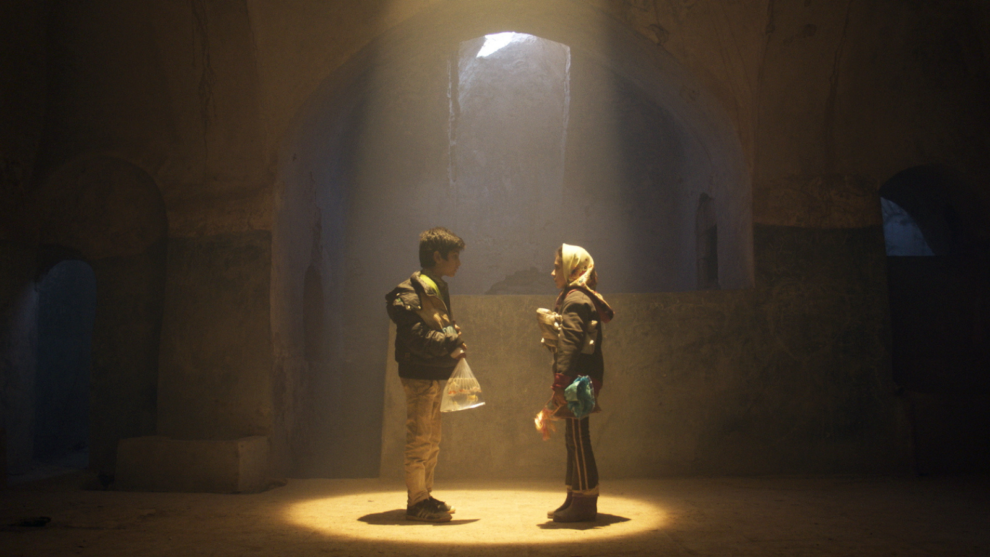Iran-born but UK-based Hassan Nazer's fifth feature is set up as a children's movie, but is essentially a tribute to Iranian cinema as much as a disillusioned look at what happens after the movie festivals, as a concept, end.
Winners is screening at Edinburgh International Film Festival

The film begins with a woman entering a taxi, before she gets out for a moment in a road filled with traffic. The police almost immediately arrive, forcing the driver to move, but after he circles and returns, the woman is nowhere to be found, and even more, there is a golden statue left in the passenger seat. It is actually an Oscar, but the driver has no clue about it, eventually leaving it in the local post office, where an elderly postal worker, thinking it is a doll of sorts, hides it in his bag and takes it to his village. Soon, the statue ends up in the hands of two kids, nine-year-old Yahya, who is actually a rather dedicated film buff, and his friend Leyla. As more suitors for the “doll” eventually appear, the kids are forced to hide it, even putting on a dress on it. However, their efforts to sell it are met with failure, since no one is particularly interested in such a “toy”. Eventually, though, it is revealed that they are not the only ones with secrets in the area, and perhaps Saber, who employs the kids of the area to gather garbage of value, and his associate, elder man Naser, maybe are something more than they appear to be.
Using the Oscar statue as a prop and as a comment, essentially highlighting how secluded Iranian people can be on occasion, Hassan Nazer presents a movie that unfolds in a number of levels, retaining throughout, a very entertaining sense of somewhat bitter humor. To begin with, the tribute to (Iranian) cinema is one that permeates the narrative. Starting with the intro that states the the film is dedicated to Abbas Kiarostami, Asghar Farhadi, Majid Maijdi and Jafar Panahi, continuing with Yahya's love for movies and his relationship with Saber who provides movies for him and the arc of the latter and Naser, and concluding with the taxi scene, in a rather obvious tribute to Jafar Panahi's “Taxi”, this love is everywhere to be found in the movie. Even the scenes where Yahya's mother chastises him for watching films late at night, seems to move in the same path, as much as the repeating mention of “Cinema Paradiso”.
At the same time, Nazer also makes a more disillusioned comment, about the chasm between the industry, and particularly the festival circuit, and the cast and crew of movies, particularly the ones outside the US and Europe. The whole arc of Naser, who is actually played by the once Golden Bear Winner for Majid Majidi's “The Song of Sparrows” Mohammad Amir Naji, in a intriguing meta level, highlights this concept, of what happens when the (festival) party is over, in a rather pointed, dramatic, but also humorous and entertaining fashion, with the veteran actor giving a great performance.

On yet another level, Nazer also shows the difficulty of living in small towns in Iran, where the kids have to work to help their family from a rather young age, even doing hard labor such as picking garbage from landfills. That the movie never becomes “misery porn”, despite the narrative conditions to do so, emerges as one of the biggest directorial traits here, along and through Nazer's use of humor, which is highlighted repeatedly in Saber's mispronouncing names (the Eric Banana one will definitely make you laugh).
Also of note is the way Nazer handled his kid actors, a trait that seems to be inherent in Iranian cinema, drawing great performances from Parsa Maghami as Yahya and Helia Mohammadkhani as Leyla, as much as the rest of the kids that appear in the film. Hossein Abedini as Saber is also quite good, especially in the scenes he is fighting with Yahya or Naser.
Arash Seifi and Arash Seyfijamadi's cinematography captures both the urban and the rural settings quite nicely, with a focus on realism, with the images of the sunset in particular being quite memorable. Hamid Bashe Ahangar, David Arthur, Reza Jouze, and Nazer's own editing results in a rather fitting, relatively fast pace, while at 85 minutes, the movie definitely does not overextend its welcome.
Apart maybe from the intro, which remains somewhat disconnected with the rest of the movie, “Winners” is a film with very few faults, that manages to present Nazer's intriguing comments through a rather entertaining package that retains interest from beginning to end.
















